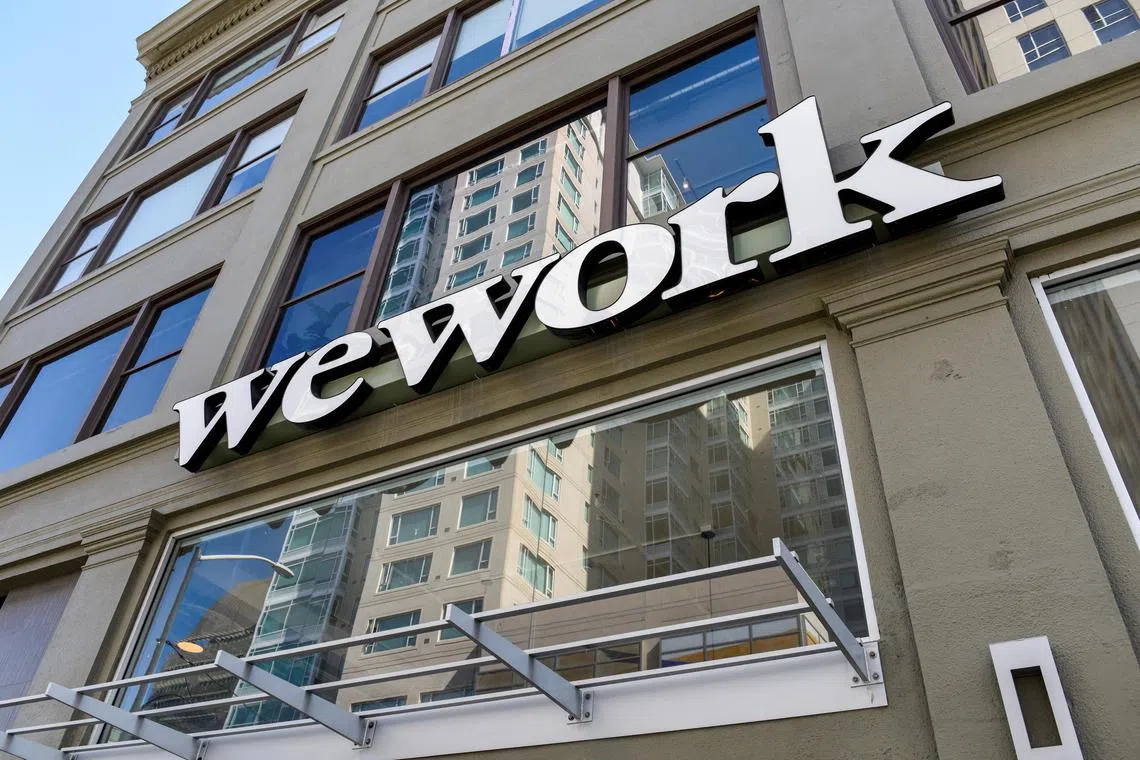WeWork, once most valuable US start-up, succumbs to bankruptcy
Sign up now: Get ST's newsletters delivered to your inbox

WeWork, whose meteoric rise and fall reshaped the office sector globally, sought US bankruptcy protection on Nov 6.
PHOTO: REUTERS
NEW YORK – WeWork, the start-up whose meteoric rise and fall reshaped the office sector globally, sought United States bankruptcy protection on Monday, after its bets on companies using more of its office-sharing space soured.
Just four years removed from a US$47 billion (S$63 billion) valuation, it is perhaps the ultimate testament to the pitfalls of the venture capital mantra of growth at all costs.
Exactly how much investors are able to recoup – and the future of WeWork itself – now hinge on its ability to discharge scores of long-term leases
WeWork in a statement said it has entered into a restructuring agreement with key stakeholders to drastically reduce its existing funded debt, and also intended to file recognition proceedings in Canada.
The company’s locations outside of the US and Canada, as well as its franchisees around the world, are not affected by these proceedings, it added.
The move represents an admission by SoftBank, the Japanese technology group that owns about 60 per cent of WeWork and has invested billions of dollars in its turnaround, that the company cannot survive unless it renegotiates its pricey leases in bankruptcy.
Shareholders, including billionaire Masayoshi Son’s SoftBank Group, are likely to see their equity stakes wiped out, while most creditors may recover just pennies on the dollar.
WeWork, which never posted a quarterly operating profit in its history, could not cut costs fast enough to support its operations.
The disruption wrought by Covid-19 and a surge in telecommuting ultimately proved too much.
WeWork’s shares have fallen about 98.5 per cent so far in 2023.
Profitability has remained elusive as the company grapples with its expensive leases and corporate clients cancelling because some employees work from home.
Paying for space consumed 74 per cent of WeWork‘s revenue in the second quarter of 2023.
In a filing with the New Jersey bankruptcy court, WeWork listed estimated assets and liabilities in the range of US$10 billion to US$50 billion.
“WeWork could use provisions of the US bankruptcy code to rid itself of onerous leases,” law firm Cadwalader, Wickersham & Taft LLP said in a note to landlords on its website in August. Some landlords are bracing themselves for a significant impact.
“As part of today’s filing, WeWork is requesting the ability to reject the leases of certain locations, which are largely non-operational, and all affected members have received advanced notice,” the company said in a statement.
Under its founder Adam Neumann, WeWork grew to be the most valuable US start-up.
It attracted investments from blue-chip investors, including SoftBank and venture capital firm Benchmark, as well as the backing of major Wall Street banks, including JPMorgan Chase.
Mr Neumann’s pursuit of breakneck growth at the expense of profits, and revelations about his eccentric behavior, led to his ouster and the derailment of an initial public offering in 2019.
SoftBank was forced to double down on its investment in WeWork, and tapped real estate veteran Sandeep Mathrani as the start-up’s chief executive.
In 2021, SoftBank cut a deal to take WeWork public through a merger with a blank-cheque acquisition company at a US$8 billion valuation.
WeWork managed to amend 590 leases, saving about US$12.7 billion in fixed lease payments.
But this was not enough to compensate for the fallout from the pandemic, which kept office workers at home.
Many of its landlords, who were also feeling the squeeze, had little incentive to give WeWork a break on the terms of their leases.
While WeWork had some success in signing up large conglomerates as clients, many of its customers were start-ups and smaller businesses, which cut their spending as inflation soared and economic prospects soured.
Adding to WeWork‘s woes was competition from its own landlords. Commercial property companies that traditionally only entered into long-term rent agreements started offering short and flexible leases to cope with the downturn in the office sector.
Mr Mathrani was succeeded as WeWork CEO in 2023
WeWork engaged in debt restructurings, yet this was not enough to stave off its bankruptcy. The company last week secured a seven-day extension from its creditors on an interest payment, to win more time to negotiate with them.
Shortly before WeWork filed for bankruptcy, Mr Neumann said in a statement, “I believe that, with the right strategy and team, a reorganisation will enable WeWork to emerge successfully.” REUTERS, BLOOMBERG


